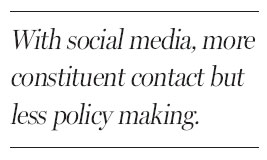Government by tweet
Updated: 2012-04-22 07:34
By Christine Digangi(The New York Times)
|
|||||||
Social commentary dominates your Twitter feed, imploring you to retweet messages and show your opposition to restrictive immigration laws. Facebook friends lobby you to "like" their post denouncing a war between Israel and Iran.
Click. You have added your voice to the thousands, maybe millions, asking politicians for change.
Social media amplifies the voices of citizens to the point where politicians are constantly reacting to the shifting demands of the online mob. These voices make it more difficult for government to plan for the long term.

Howard Wolfson, a deputy mayor of New York City, told The Times that social media "creates both opportunities - for information-sharing and for citizen empowerment - and challenges, for governments, for businesses, for media, to see beyond the next tweet, or the next blog post."
The flip side is that social engagement enables the ruling class to engage its citizenry, rebutting the notion that it is out of touch with ordinary people, Paul Geitner wrote in The Times.
The European Citizens' Initiative, which began April 1, is an effort by the European Union to let its constituents propose laws. The proposals sent so far include: declare access to water and sanitation a human right, ban genetically modified crops, establish European Obesity Day and mandate work-free Sundays, The Times reported.
Tony Venables, director of a nonprofit that is working with E.U. agencies to promote the initiative, told The Times: "I think what we'll see over time is European law that is more value-driven."
With all the special interests, it becomes a battle of influence versus importance. Do the politicians focus on the most beneficial projects, or the ones that garner the most attention?
"The news itself has become so ubiquitous, so constant that our eyes only pop out when a really shiny object comes flowing down the river," Jim Bankoff, the head of Vox Media, told The Times. "People don't just consume it, they 'like' it, retweet and e-mail it. All this sharing leads to more sharing, which sets off a trend, which sparks more coverage."

Past precedence has empowered the Internet population, Brian Stelter wrote in The Times, as seen when Invisible Children's "KONY 2012" video drew international attention to Joseph Kony, the head of an African guerrilla group that has attacked civilians for decades. It took three days for the video to reach more than 50 million views, The Times reported, meeting the organization's goal of making Kony famous.
As much as social media inspires users to engage with current events, the volume of raised voices can overwhelm lawmakers trying to harness such energy into policy making.
In a speech in March in Singapore, Mayor Michael R. Bloomberg of New York said, "We are basically having a referendum on every single thing that we do every day. And it's very hard for people to stand up to that and say, 'No, no, this is what we're going to do,' when there's constant criticism, and an election process that you have to look forward to and face periodically."
Politicians can try to ignore the noise. The E.U. plans to reject citizen proposals it deems "abusive, frivolous or vexatious." But the passionate Twittersphere is not easily quieted. Citizen-politician conversations can resemble digital shouting matches: may the loudest faction win.
For comments, write to nytweekly@nytimes.com.
(China Daily 04/22/2012 page9)